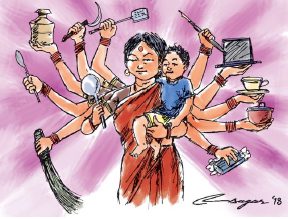Bangladesh, while seen nominally as a parliamentary democracy, is in reality largely governed by traditional customs and mores that define everyday social and political relations. Gender and cultural norms in Bangladesh conform to the broader patriarchal society, in which prevalent gender norms and values are usually rewarding to men, while ostracizing to their gender minority counterparts.
These norms shape and prescribe both gender expression (clothes, hair, makeup, posture etc.) and behavior (attitudes, beliefs, thinking, emotional inner life, etc.) that members of the society should follow to conform. These norms are also constraining for men and boys in various ways, although they are particularly harmful for women and girls and for gender and sexual minorities, and can prevent LGBTQ+ individuals from reaching full potential and fully expressing themselves in media and civic debate.
This gender assessment focuses on social and cultural norms including roles, responsibilities, legal frameworks, and power relations to identify needs, challenges, constraints and opportunities in the civic space and media environment in Bangladesh. The study also examines specific vulnerabilities of the LGBTQ+ community.
